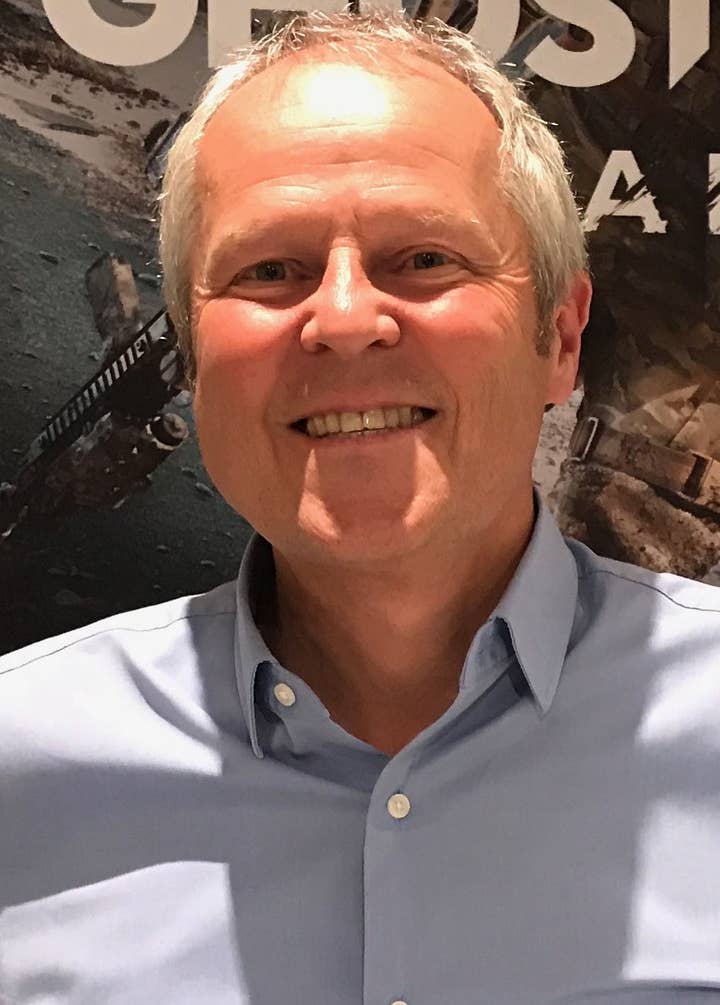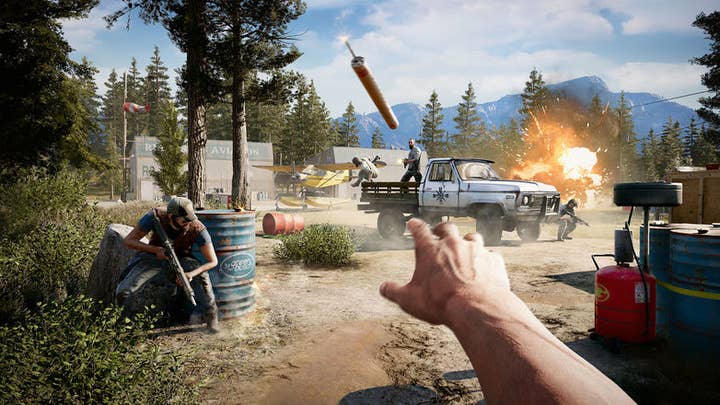Yves Guillemot on the thin line between politics and entertainment
Ubisoft CEO speaks about the difficulty of tackling sensitive real-world issues while running a multi-billion dollar entertainment firm
When I ask Yves Guillemot 'Are your games political?', he chuckles.
This is partly because I've already warned him my first question will be somewhat tongue-in-cheek -- as has already been discussed on this very site, such a question does not serve the conversation in the way some might think -- but also because it's a question his executives and leading developers have been hounded by for a good couple of years now.
To that end, he rolls out the usual company line -- "Our games have a goal to make you think about the different possibilities. We want to show the different opinions that exist and then you have to make your own" -- before I probe further.
Ubisoft has at least attempted to tackle real-world issues in most of its blockbuster games in the past few years (and not just as a backdrop for all the glorious shooting and explosions), although it tends to pull its punches by the time the final product arrives. Hence the ongoing criticism and the frequency with which Ubisoft execs are asked this slightly misguided question.
Watch Dogs 2 touched on racism and racial profiling but diverted the blame to one rich, white guy rather than systemic issues of society. Far Cry 5 looked set to explore religious extremism but the cult depicted was far more watered down by those that exist in real life.
As the writer of Ghost Recon Wildlands recently discussed, the game attempts to show the impact of the drug trade on innocent Bolivians forced to participate, but it's done through other optional and easy-to-miss discoverables. As with all these games, the overall story is told only from a single perspective -- in Wildlands, the US Special Forces come to save the day -- making it difficult for Ubisoft to assert as neutral a stance as it claims to have.

"You can't show all the point of views," Guillemot admits. "But it's not because you play the Ghost [in Wildlands] that you don't understand what the other people are living and seeing. We give lots of possibilities for you to explore and understand a situation. Now what people can do is go outside the game and also get more information on what the situation is."
This is something Ubisoft itself has experimented with. In the run-up to the launch of Wildlands, the publisher's UK marketing team commissioned a feature-length documentary on the facts behind the game's fiction, exploring the full impact of the drug trade on Bolivia and its people.
Again, the difficulty lies in the perception of video games as entertainment products. Documentaries are common in film and TV, and there's an entire industry of non-fiction books, but beyond some acclaimed indie titles, video games remain dedicated to fiction -- and predominantly lighter-hearted fiction at that. And that's because it sells.
For all the criticism Ghost Recon Wildlands received from the media for its lacklustre attempt at tackling such difficult subject matter, Guillemot tells us it still went on to sell 15 million copies. Which is why the upcoming Breakpoint doesn't build on what Wildlands started, instead swapping out real-world drug traffickers for another fictional rich white guy selling tech to corrupt regimes. Perhaps Ubisoft believes that it will reach 20 million if it delivers the type of inconsequential high-octane antics its audience expects.
"We have to be careful to remain entertaining... The goal each time is to make it believable, but still fun and interesting. It's a thin line we have to follow as an industry"
"We have to be careful to remain entertaining," Guillemot explains. "When we go too serious into something... There are other mediums that can tell you more about different subjects. The goal each time is to make it believable, but still fun and interesting. It's a thin line we have to follow as an industry. How can we make people feel that this can happen, and at the same time still be fun and not too serious?"
How thin that line is truly shows in Ubisoft's games. Far Cry 5, for example, attempts to pit you against a cult, depicting how extremism can drive so many people to perform certain acts or adopt an anti-establishment, anti-authoritarian mindset. As with Wildlands, this perspective is not playable.
Instead, you play only as the police and the conflict is sold as action-packed fun. No time to explore the cult's grievances when you're running down its members with a quad bike, wielding a rocket launcher, backed up by a plane with a mounted machine gun and a friendly but ferocious bear named Cheeseburger.

It's a juxtaposition that threatens to undermine any attempt to delve deeper into real-world issues, even allegories of them.
"But that's our life," Guillemot counters. "We know that there are all sorts of situations everywhere and we still want to have a fun, interesting life. Here, we mix entertainment and the possibility to have fun with the world around us -- that can be good and also extreme or different from what we expect."
"We know that there are all sorts of situations everywhere [in the world] and we still want to have a fun, interesting life"
Another factor is the sheer number of people working on these games, which makes it more difficult to have a unified vision. Occasionally, you'll have a creative director as bold as Clint Hocking, who said that Watch Dogs Legion "has a message for sure", one of unity among the people.
That message in itself is quite neutral, and one few could object to. If someone were to take a more definitive or potentially controversial position on any given subject, the hundreds of developers creating the trees, water and wildlife of the game won't necessarily share the same viewpoint.
Guillemot emphasises that the core creative team is given as much freedom as possible with the games they work on, and the multi-project nature of an organisation as vast as Ubisoft means there are always alternatives for those who object to any given game.
"You select a team of creators that have a vision of what they want to create," he says, "and the people that work with them either believe in it and help to grow it, or they go on other games. They can choose.
"Most of the time, we say we want to have the capacity for a human being to have an influence on their environment and the freedom to leave in peace. We don't see many people that are against that kind of thing."
There's potential in Watch Dogs Legion -- already dubbed a Brexit game before its E3 unveiling had even finished -- for Ubisoft to deliver on its vision of multiple perspectives, as editorial VP Tommy François hopes. This is thanks to the core feature, which enables players to as any NPC, but we'll have to wait for the game's launch next year to find out how effective this is.
The increasing presence of politics in video games -- or, more accurately, the timid steps major developers and publishers are taking towards using them as a medium to explore sensitive issues -- has not been met with universal praise.
As has become all too evident in the past five years, there is a toxic aspect to the gaming audience that balks at the idea of anything attempting to break beyond the typical male power fantasy and shallow entertainment games have historically offered. The type of people who can type "Keep politics out of my games" into their social media platform or forum of choice purely by muscle memory. It's a minority, to be sure, but one so loud it becomes hard to ignore. But Guillemot tries to see the positive side of this discourse.
"Our audience is very vocal," he concludes. "They like to speak about different topics -- we have Reddit, which is a place where people speak about many things. It's a lively community and they speak about everything, that's why you have all sorts of topics that are discussed. It's actually good, I think."
We'll have more from our time with Yves Guillemot next week.

